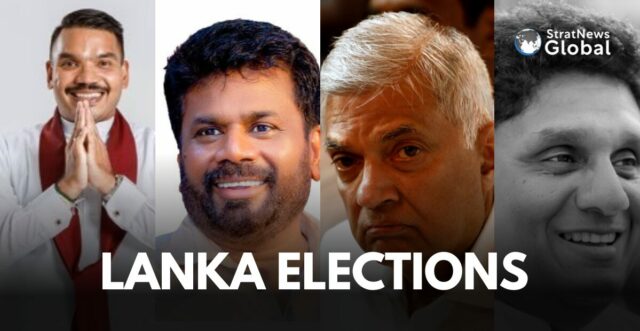In a week from now, Sri Lankans will elect a new president. Incumbent President Ranil Wickremesinghe is one of five candidates in the fray. Among them are two who come from political families and a third with Marxist underpinnings, who is widely believed to be the favourite.
This election is seen as crucial if the country is to stabilise economically and grow. External powers – China, the U.S. and India have vested interests in the electoral outcome.
It is the first electoral process in over four years and follows the widespread protests that shook the nation in 2022. That year mass protests saw the overthrow of President Gotabaya Rajapaksa. Ranil Wickremesinghe was then elected president through a parliamentary vote. Here’s a quick profile of the five main contenders.
1. Ranil Wickremesinghe
Ranil, 78, is struggling financially to stay in the race given the withdrawal of support by the Sri Lanka Podujana Peramuna (SLPP). But with the backing of 90 MPs, he has registered as an independent candidate and plans to make the best of a bad job.
Ranil has had a storied political career. He’s been elected prime minister six times and as president, has stitched back the shattered economy with help of a $2.9 billion International Monetary Fund (IMF) bailout programme. He brought down inflation from a steep 70% in September 2022 to 1.7% in June. He managed to strengthen the Sri Lankan rupee and rebuilt previously decimated foreign exchange reserves too.
However, while the economy may have stabilised, poverty and inequality have grown.
2. Sajith Premadasa
Current Leader of the Opposition and son of the late President Ranasinghe Premadasa, who was assassinated by the Tamil Tigers in May 1993. Sajith is not therefore new to politics, but having broken away from the UNP, he has his task cut out in ensuring the Samagi Jana Balawegaya (SJB) party he now now heads looks credible.
His party has established itself as “pro-poor”, taking after his father’s legacy to appeal to the economically marginalised. Sajith’s major poll campaign is using government-owned land for building low cost homes for the poor and middle class.
Sajith has promised to start discussions with the IMF to find ways to ease people’s tax burden. Sri Lanka is in the middle of reforms and a debt restructuring program under an IMF agreement. As per the agreement, taxes have been increased to boost state revenue. Sajith has said he will try to modify the IMF agreement in a “humanistic manner.”
3. Anura Kumara Dissanayake
In spite of having just three seats in the country’s 225-member parliament, Anura, 55, from Janatha Vimukthi Peramuna (JVP) and National People’s Power (NPP) is rooted in the center-left political tradition.
The JVP emerged from the pro-China wing of the Sri Lanka Communist Party in the 1960s and played an active role in the mass protest that forced President Rajapaksa’s resignation in 2022. His party also has a dark past, of failed Marxist-inspired insurrections that led to mass killings.
However, Dissanayake has a cleaner image than the party. His biggest slogan is his promise to tackle corruption.
Historically, the NPP has also opposed IMF programmes, but its latest manifesto has adopted a different approach. Anura’s goal, like Sajith, is to make modifications to the IMF agreement to tackle the economic crisis of the country. He is seen by many as most likely to win.
4. Namal Rajapaksa
The next in contention is 38-year-old Namal, son of former President Mahinda Rajapaksa and nephew of the ousted President Gotabaya Rajapaksa. He is a surprise entrant, as the candidate of the SLPP, which has ditched Wickremesinghe..
While many see Namal as merely a face that has emerged through nepotism, several are hopeful that his inexperience and youth could be an advantage. Namal has opposed the government’s privatisation and taxation policies and is against the implementation of the 13th Amendment that would give autonomy to the north and east. He may prefer closer ties with China rather than deeper economic relations with India.
Sri Lanka And South Asian Geopolitics
Sri Lanka’s neighbours will be keeping a close eye on the presidential election. It seems clear that a Wickremesinghe or Premadasa administration may lean more towards India and the West, while a Dissanayake win could see closer relations with China.
India may prefer to quietly back those who will keep a respectable distance from China. India would also want justice for the ethnic Tamil minority, which means implementation of the 13th amendment. That is a tricky bridge to cross for any ethnic Sinhala politician.





